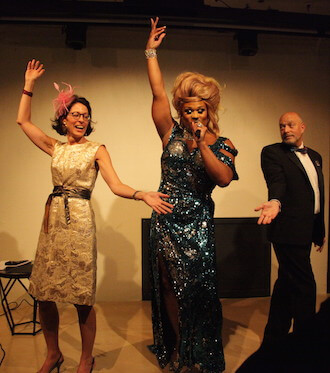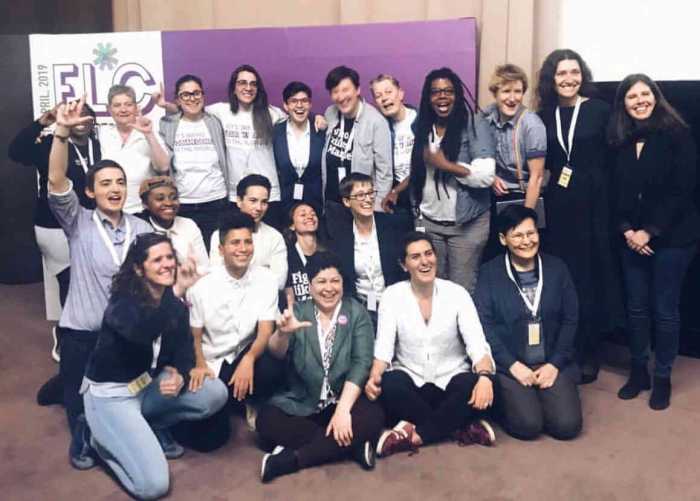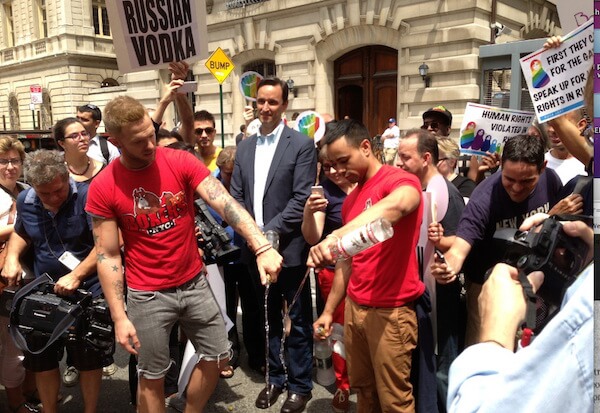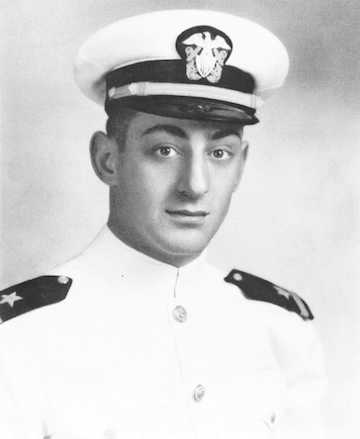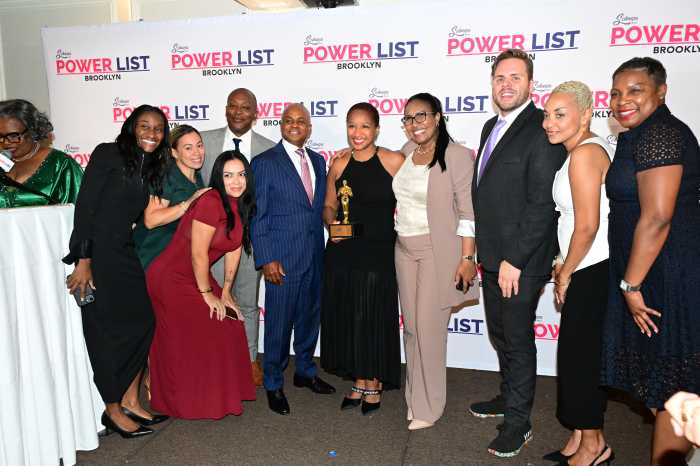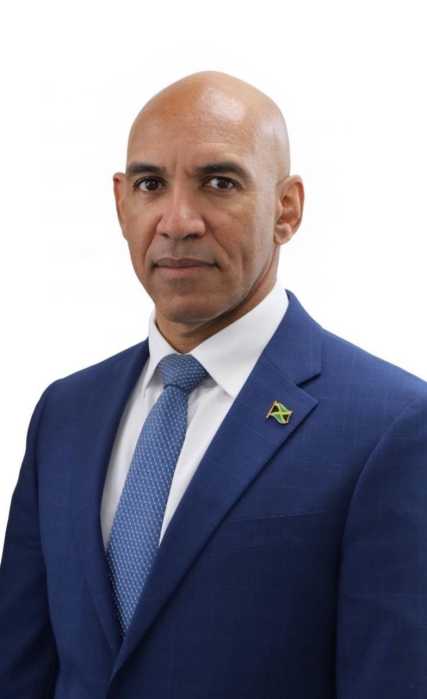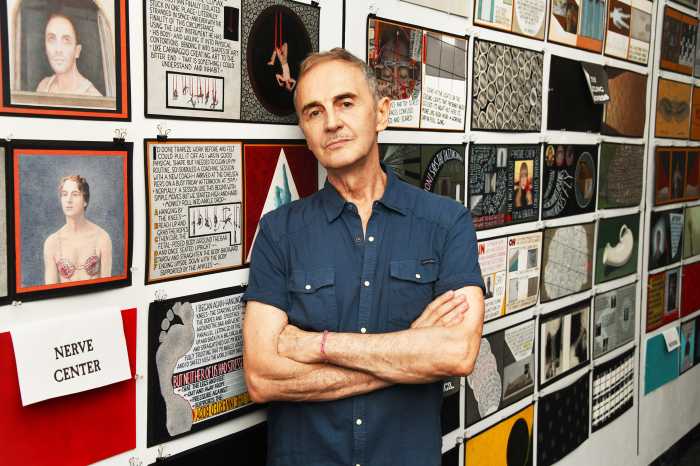June 20 was a day when gay men could kiss in Vermanes Darzs. | MICHAEL LUONGO
The Europride March had come just a few paces from its stepping off point in the lushly green Vermanes Darzs, a park near Riga’s Old City adorned this day with balloons, rainbows, and banners in a multitude of languages. Abba’s disco classic “Dancing Queen” blared from loudspeakers as Kaspars Zalitis, co-chair of Riga Europride 2015, turned the corner from Elizabetes Iela into Brivibas Iela and, with a smile breaking out across his face, shouted, “Now, you are now on Freedom Street!”
Zalitis was referring to the literal translation of Brivibas Iela — Riga’s most important boulevard, famed for its art nouveau structures, monuments, and even the notorious former KGB headquarters — but the statement transcended the mere physical location. Nearly 5,000 people were flowing behind him, a great number of them not from Latvia, but from other countries of the European Union, from the United States, and even from neighboring Russia, where Vladimir Putin has persecuted the LGBT community.
The June 20 event was one that many worried would never happen.
Five thousand strong march in Riga, with robust security protection and subdued opposition
Karlis Streips, a Latvian-American TV personality, famous as the first openly gay man in that Baltic nation, said, “I am thinking I am going to have to crawl somewhere and have a good cry, this is such a triumph.”
Europride co-chairs Kristine Garina and Kaspars Zalitis with TV star Karlis Streips on the rally stage. | MICHAEL LUONGO
There were few protestors. Kristine Garina — who with Zalitis, is a co-chair of both Europride and Mozaika, Latvia’s LGBT rights group — put the number of naysayers at just 40, though that might have included only those holding signs or visibly gesturing in contempt. Opponents of the LGBT community were scattered along the march’s 2.2 kilometer route and at the entrances to Vermanes Darzs, where a rally followed.
A 22-year-old woman named Victoria was among the march’s opponents, holding up a protest sign in English. Traveling to Riga from her home in Aizpute, a town more than 100 miles away, she commented, “If they can say something, I can say something.” Most protest signs were in Latvian, with a few in Russian. Many of those against the parade merely waved their hands with thumbs down repeatedly, something for which no translation was needed.
An extremely robust security force was present, from police to riot squads in heavy black gear. Past LGBT gatherings in Riga were met with threats of violence and even incidents of feces being flung at marchers, but there were no incidents of note, outside the report of one protestor burning a Rainbow Flag, something this reporter did not witness.
Berlin drag star Shiaz Legz. | MICHAEL LUONGO
Berlin drag personality Shiaz Legz, known for a Conchita Wurst parody, had earlier expressed apprehension about appearing in a dress during the march, choosing instead standard street clothing and hair woven through with flowers. Afterward, Legz commented, “I think it wouldn’t be a problem and I didn’t feel in danger, but you are obviously more exposed as a drag queen. I really wanted to do it in drag, and I really feel I could have. I had goosebumps the whole way down.”
A small group of gay Swedish police officers marched in uniform, Stockholm cop Martin Marmgren explaining, “To use uniforms in our march, we needed permission. The Swedish police have realized this is an important human rights proposal.”
Stockholm police officer Martin Marmgren. | MICHAEL LUONGO
Marmgren said he hoped the intense security surrounding the march did not keep away people on either side of the question of LGBT rights, but he noted that police participation in protecting a march helps officers better understand the community.
“When you are doing a Pride Parade, you want the police to be part of the change in attitude,” he said.
For Linda Freimane, one of Mozaika’s founders, the change was evident. Saying she thought the march went off better than expected, she explained, “There always will be concerns, even if the police are doing a good job. The population now is changing, though. In the past we had fences [along the march route], and now we have happy people on the side, and we can see them and they can see us.”
Curika was struck by the youth of some of the anti-gay protesters.
“It’s the churches or maybe the neo-Nazis, one or the other,” she said. “I am surprised by it, especially the young women. At the same time, there are little old ladies with Rainbow Flags waving on the street.”
The greatest change, though, might have been the fact that Mozaika was permitted to march on Brivibas Iela, or Freedom Street, Curika said.
“The first year with the police, there was no way, and suddenly, we are marching on it and it’s fine,” she said.
Linda Freimane, a founder of Mozaika. | MICHAEL LUONGO
Mozaika co-chair Zalitis said, “It’s a dream come true. There are too many emotions bubbling. It’s the first time in a long time I am proud of my country. I am talking about 5,000 people in a parade in Latvia.”
A strong international diplomatic presence was a big part not only of the rally and march but other Europride events over the weekend, including several conferences, art openings, and other cultural presentations. The American presence was led by Sharon Hudson-Dean, the chargé d’affaires ad interim who leads the mission at the US Embassy there, and Randy Berry, the out gay State Department envoy for LGBT human rights. They were joined by the ambassadors from the United Kingdom, Canada, Israel, the Netherlands, Norway, and Sweden.
Hudson-Dean said, “We’re thrilled it went so well,” and lauded the “very good support from law enforcement.”
A 22-year-old woman protesting Europride. | MICHAEL LUONGO
The Latvian government also participated in Europride events, with Baiba Braze, an ambassador who has security policy responsibilities in the Ministry of Foreign Affairs, speaking at the June 19 Freedom Conference. There, Braze read a statement from Edgars Rinkevics, Latvia’s foreign minister who recently made history by coming out as gay.
Both Hudson-Dean and Berry marched and spoke from the rally stage, along with Stuart Milk, nephew of slain LGBT activist Harvey Milk and co-founder of the Harvey Milk Foundation.
“I think this has been an inspiration to see so many Latvians out and see the symbolism and the support of the Latvian police, but likely they were not very needed,” Berry said. “I feel very hopeful when you see change.”
New Yorker David Schneider was also on hand, representing Heritage of Pride, which organizes Pride Week, including the June 28 march, in Manhattan.
“I think this is wonderful compared to Warsaw in 2010,” Schneider said, referring to the first Europride held in a former Soviet bloc nation that was marred by violence. “There was no violence against it. I think Latvia is more accepting. Any Pride I go to where they don’t throw a Molotov cocktail at me is a good Pride.”
Singer and songwriter Steve Grand and Randy Berry, the State Department’s special envoy for LGBT rights. | MICHAEL LUONGO
Unlike Poland, however, Latvia, along with its Baltic neighbors Lithuania and Estonia, was actually a part of the Soviet Union until 1991. Riga, long one of Imperial Russia’s most important seaports, has a big conservative Russian population, which makes the city a tense potential flashpoint in Putin’s efforts to expand his nation’s influence. That context was on the minds of many who traveled to Riga for Europride.
One of the rally speakers was Olena Shevchenko, active with the Ukrainian LGBT group Insight. She said, “I feel a big pride for everything that is happening here because unfortunately in the Ukraine, we do not have this. I think maybe in five or six years, it will become possible. I personally want to have Europride in the Ukraine.”
A lady in a pink suit makes an unmistakable sign of disapproval. | MICHAEL LUONGO
The rally headliner was out gay singer/ songwriter Steve Grand, who also headlined Europride’s official closing party at the Palladium dance club later that evening. Waving a rainbow flag over his head while singing, he exclaimed, “This is why I am here.” Grand, who was on a tour of several European nations under the auspices of the State Department, ran a workshop for local Latvian musicians, where he talked about how he combined LGBT activism with his music.
Grand said that in talking to locals, he heard things familiar from his conservative, religious upbringing in suburban Chicago.
“I recognize the same fears, the same level of discomfort in the people that I recognized growing up,” he said.
New York drag performer Peppermint, making her second trip to Latvia, was also a Europride headliner.
“It’s a different feeling because it’s Pride. Emotional, poignant, and so unexpected. The gravity of everything is a little bit of a different feeling from the New York Pride. I feel we are about to cross a threshold here that we crossed long ago in New York, and that is a new feeling for me.”
That Riga is a new frontier in the battle for LGBT rights was highlighted, as well, by Irene Hemelaar, the director of Amsterdam’s Gay Pride, which will serve as host for Europride 2016.
“This year, Europride is a Pride of action,” she said. “It is so special to be a part of this Pride.”
Sharon Hudson-Dean, the head of the US mission to Latvia, with Peppermint and Heritage of Pride’s Alan Reiff at a gala Europride dinner. | MICHAEL LUOGO
Her hands motioning toward the audience enjoying the rally, holding hands, kissing lovers, wearing temporary rainbow tattoos on their cheeks, Hemelaar continued, “In Riga, people can’t sit like this in daily life. People don’t realize this living in Amsterdam today. It is so special that you can live the life everybody should be able to live, that everyone should be able to enjoy. It is strange. We have one Europe, and the differences are so huge. As Amsterdam, we have a responsibility to tell these stories through Pride. The story of other countries is a bigger one than us. In Amsterdam, we can give them a platform.”
Acknowledging that most LGBT in Amsterdam may feel the fight is over, she said, “We are never there. We have something to fight for, even in the Netherlands.”
Still, Pride Day in Riga left Latvians more hopeful than ever.
“You can feel the progress,” Mozaika’s Garina said as the march concluded. “I personally had very little in expectations and this went very well. I am happy for the local turnout and this was what I was concerned about.”
What took place in Riga, Garina said, will have resonance throughout the former Soviet bloc.
“There will be Pride in the Ukraine,” she said. “One day, there will be Pride in Moscow. It will change. It if changes here, it will change there too.”
Editor's note: In the original version of this post and in the Gay City News print issue, Linda Freimane was mistakenly identified as Linda Curika.

